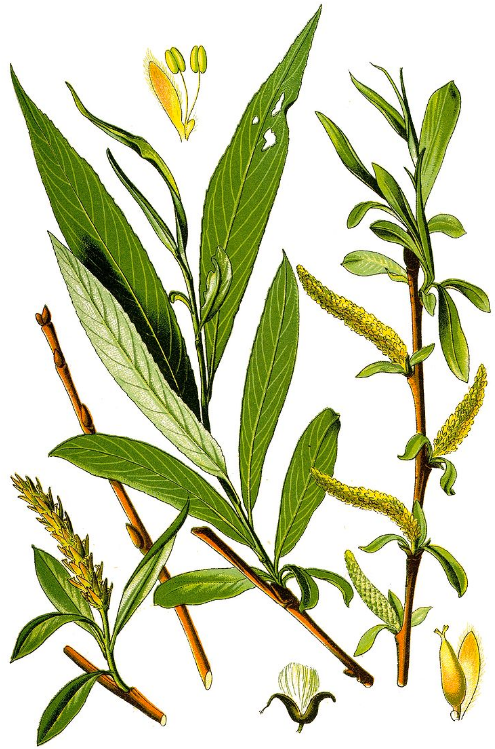
White willow (Salix alba) is a natural source of salicylic acid (credit: Otto Wilhelm Thomé (1885)/public domain)
Scientists from the Gladstone Institutes have identified a new pathway by which salicylic acid — a key compound in aspirin (acetylsalicylic acid) — stops inflammation and cancer.
In a study published in eLife, the researchers found that both salicylic acid — and also diflunisal, a cousin of aspirin — suppress two key proteins (p300 and CREB-binding protein or CBP) that help control gene expression throughout the body.
These proteins are epigenetic regulators that control the levels of proteins that cause inflammation or are involved in cell growth.
So by suppressing these proteins, these compounds can prevent cellular damage caused by inflammation. This study provides the first concrete demonstration that both p300 and CBP can be targeted by drugs and may have important clinical implications.
“Salicylic acid is one of the oldest drugs on the planet, dating back to the Egyptians and the Greeks, but we’re still discovering new things about it,” said senior author Eric Verdin, MD, associate director of the Gladstone Institute of Virology and Immunology. “Uncovering this pathway of inflammation that salicylic acid acts upon opens up a host of new clinical possibilities for these drugs.”
Shrinking tumors
Scientists at Gladstone and Sylvester Comprehensive Cancer Center, at the University of Miami Miller School of Medicine, worked together to test whether suppressing p300 with diflunisal would suppress leukemia growth in mice. As predicted, diflunisal stopped cancer progression and shrunk the tumors in the mouse model of leukemia.
“We have conducted a clinical trial of salicylic acid in patients with hematologic cancers and found it to be safe,” said Sylvester director and co-author Stephen D. Nimer, MD. “Thus, this collaborative effort to develop novel epigenetic therapies is an important next step in our journey to find more effective treatment for leukemia patients.”
The scientists are now pursuing a clinical trial that will test the ability of salicylic acid to treat patients with leukemia as part of novel combination therapies. Other possible clinical applications for salicylic acid include other forms of cancer, type 2 diabetes, inflammatory diseases, and even neurodegenerative disorders, such as Alzheimer’s disease.
Prior Gladstone research showed that another drug containing salicylic acid prevented the accumulation of tau in neurons and protected against cognitive decline in a mouse model of dementia.
Researchers from the University of Miami, University of Pennsylvania, and the National Cancer Institute also took part in the study.
Funding was provided by the University of California, San Francisco-Gladstone Institute of Virology and Immunology Center for AIDS Research (CFAR), the University of California, Berkeley Fogarty International AIDS Training Program, the American Cancer Society, the Larry L. Hillblom Foundation, the John A. Hartford Foundation, the National Cancer Institute, and the UCSF Geriatric Research Training Program.
Abstract of Salicylate, diflunisal and their metabolites inhibit CBP/p300 and exhibit anticancer activity
Salicylate and acetylsalicylic acid are potent and widely used anti-inflammatory drugs. They are thought to exert their therapeutic effects through multiple mechanisms, including the inhibition of cyclo-oxygenases, modulation of NF-κB activity, and direct activation of AMPK. However, the full spectrum of their activities is incompletely understood. Here we show that salicylate specifically inhibits CBP and p300 lysine acetyltransferase activity in vitro by direct competition with acetyl-Coenzyme A at the catalytic site. We used a chemical structure-similarity search to identify another anti-inflammatory drug, diflunisal, that inhibits p300 more potently than salicylate. At concentrations attainable in human plasma after oral administration, both salicylate and diflunisal blocked the acetylation of lysine residues on histone and non-histone proteins in cells. Finally, we found that diflunisal suppressed the growth of p300-dependent leukemia cell lines expressing AML1-ETO fusion protein in vitro and in vivo. These results highlight a novel epigenetic regulatory mechanism of action for salicylate and derivative drugs.
